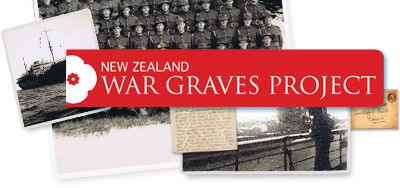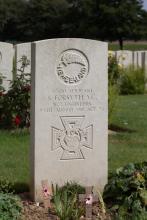"For most conspicuous bravery and devotion to duty in attack. On nearing the objective, his company came under heavy machine-gun fire. Through Serjt. Forsyth's dashing leadership and total disregard of danger, three machine-gun positions were rushed and the crews taken prisoner before they could inflict many casualties on our troops. During subsequent advance his company came under heavy fire from several machine guns, two of which he located by a daring reconnaissance. In his endeavour to gain support from a Tank, he was wounded, but after having the wound bandaged, he again got in touch with the Tank, which in the face of very heavy fire from machine guns and anti-Tank guns, he endeavoured to lead with magnificent coolness to a favourable position. The Tank, however, was put out of action. Serjt. Forsyth then organised the Tank crew and several of his men into a section, and led them to a position where the machine guns could be outflanked. Always under heavy fire, he directed them into positions which brought about a retirement of the enemy machine guns and enabled the advance to continue. This gallant N.C.O. was at that moment killed by a sniper. From the commencement of the attack until the time of his death Serjt. Forsyth's courage and coolness, combined with great power of initiative proved an invaluable incentive to all who were with him and he undoubtedly saved many casualties among his comrades." [The London Gazette, No. 30967, 18 October 1918]
“SERGT. Samuel Forsyth, of the New Zealand Engineers, who was the latest New Zealander to win the Victoria Cross, sealed his devotion with his life. He is the first Wellington member of the New Zealand Expeditionary Force to win the coveted distinction, but two other Wellington lads serving with the Imperial and Australian Forces respectively had already achieved it. These were Brigadier-General Freyberg (with the Imperial Army) and Private Thomas Cooke, who was serving with the Australian Forces when he performed the gallant exploit which won him the Cross, but died in winning it. The same fate has befallen Sergeant Samuel Forsyth, who leaves behind him a record, of splendid service to console his bereaved parents. His age was 26 last April, and he was one of the two sons of Mr Thomas Forsyth, of Cottleville terrace (Thorndon), nightwatchman on the s.s. Maori. He was born at Newtown and was educated at the Terrace School under Mr Geo. MacMorran. After leaving school he was put to the cabinet-making trade, and when war broke out he was employed as a battery hand at one of the mines at the Thames.
He was one of the earliest to enlist, and he went away with the Main Body in the Engineers unit thereof. He went right through the Gallipoli campaign, being twice wounded, but not severely. Since Gallipoli, he had been on almost continuous active service in France. He was twice gassed at the Somme, and was invalided for a month. In January, 1917, having obtained a few days' special leave, he was married to his fiancee in Glasgow.
Sergeant Forsyth won his V.C. at Greyviliers [sic], where he was killed on the 24th August last. The circumstances are detailed by Sergeant Ormond Burton, in a letter to his comrade's wife: —"Sam was killed in battle on Saturday, 4th August, while fighting with my company (15th North Auckland, 2nd Auckland Battalion). He had to do a month with an infantry battalion before he obtained his commission, and he had only been a few days with us when we went into the fighting. After we had advanced for several hundred yards with great difficulty, we were violently held up by a strong German post, bristling with machine-guns and held by a strong garrison. At great personal risk Sam reconnoitred this place alone, then went back and found the tanks, which he led right to the strong point, going ahead all the way alone, and on foot, although the whole time he was exposed to the fire of the machine and anti-tank guns, which were firing directly upon him. This was one of the coolest and bravest deeds I have ever seen done. Later on he was wounded in the arm, and refused to go out until the situation was more settled, and, while going from shell-hole to shell-hole organising our line, he was killed by a sniper's shot just in front of one of our forward posts. It was impossible to recover his body just at the time, and I was wounded myself a short while afterwards, and before the next wave of attack swept on, I had to come out … Sam's life and death have both been a great inspiration to all of us who were privileged to be his friends." The Major of the fallen hero's old Battalion —the Engineers —bears similar testimony. He writes: "It is with "feelings of the deepest regret that I write these lines to express to you our sorrow at the loss of your husband. He was not with the Company at the time of his death, being temporarily attached to the Infantry before going to England to get his commission. He was always a very brave and keen soldier, and I believe met a soldier's end in doing an exceptionally brave act." The late Sergeant Forsyth's only brother is a battery hand at Wakamarina (Marlborough), and he has two sisters, one of them being Mrs William Thomas, of Newtown.” [Free Lance, Volume XVIII, Issue 957, 14 November 1918, Page 4]








![[Source: Archives New Zealand, R122498075] Samuel Forsyth](https://www.nzwargraves.org.nz/sites/default/files/styles/thumbnail/public/Samuel%20Forsyth.png?itok=xl1BaMIB)
